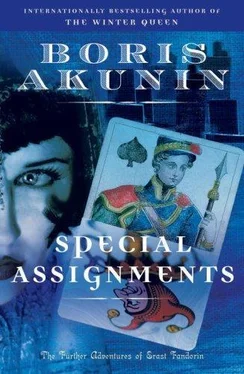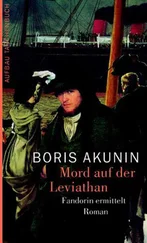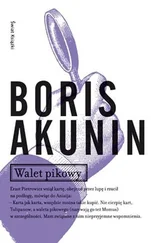Ever since his childhood, Erast Petrovich had been unable to bear the sight of tormented human flesh. He had lived long enough, seen all sorts of horrific things, taken part in wars and yet, strangely enough, he had still not learned to regard with indifference the things that human beings did to their own kind.
Realising that the irises on the wallpaper would not breathe out any scent today, Fandorin heaved a deep sigh. Since he had failed to arouse his intuition, he would have to rely on his reason. He sat down at the table and picked up his magnifying glass.
He began with the wrapping paper. It was just ordinary paper, the kind used to wrap all sorts of thing. Nothing to go on there.
Now for the handwriting. The writing was uneven and the letters were large with careless endings to their lines. If you looked closely, there were tiny splashes of ink - the hand had been pressed too hard against the paper. The writer was most probably a man in the prime of life. Possibly unbalanced or intoxicated. But he could not exclude the possibility of a woman with strong emotional and hysterical tendencies. In that regard he had to take into account the flourishes on the O’s and the coquettish hooks on the capital F’s.
The most significant point was that they did not teach people to write like that in the handwriting classes in the grammar schools. What he had here was either someone educated at home, which was more typical of female individuals, or someone who had had no regular education at all. However, there was not a single spelling mistake. Hmm. This required a little thought. At least the writing was a clue.
Next - the velvet box. The kind in which they sold expensive cufflinks or brooches. Inside it there was a monogram: A. Kuznetsov, Kamergersky Way'. That was no help. It was a large jeweller's shop, one of the best known in Moscow. He could make inquiries, of course, but they would hardly come to anything - he could assume that they sold at least several dozen boxes of that kind a day.
The satin ribbon was nothing special. Smooth and red - the kind that gypsy women or merchants' daughters liked to tie their plaits with on holidays.
Using his magnifying glass, Erast Petrovich inspected the powder box (from 'Cluseret No. 6') with especial interest, holding it by the very edge. He sprinkled it with a white powder like talc, and numerous fingerprints appeared on the smooth lacquered surface. The Collegiate Counsellor carefully and precisely blotted them with a special, extremely thin paper. Fingerprints would not be accepted as evidence in court, but even so they would come in useful.
It was only now that Fandorin turned his attention to the poor ear. Judging from the sprinkling of freckles on both sides of the ear, its owner had been ginger-haired. The lobe had been pierced, and very carelessly: the hole was wide and long. Taking that into account, and also the fact that the skin was badly chapped by cold and wind, he could conclude, firstly, that the former owner of the object in question had worn her hair combed upwards; secondly, that she was not a member of the privileged classes; thirdly, that she had spent a lot of time out in the cold without wearing any hat. The final circumstance was especially noteworthy. It was well known that street girls touted their wares with their heads uncovered even during the cold season. It was one of the signs of their trade.
Biting his lip (he still couldn't manage to regard the ear as an object), Erast Petrovich turned the ear over with a pair of tweezers and began examining the cut. It was even, made with an extremely sharp instrument. Not a single drop of congealed blood. Which meant that when the ear was severed the ginger-haired woman had already been dead for at least several hours.
What was that slight blackening on the cut? What could have caused that? Defrosting, that was what! The body had been in an ice-room - that was why the cut was so perfect: when it had been made the tissues had still not completely thawed out.
A prostitute's body placed in an ice-room? What for? What kind of fastidiousness was this? That kind were always taken straight to the Bozhedomka and buried. If they were put in an ice-room, it was either in the medical-faculty morgue on Trubetskaya Street for educational purposes, or in the forensic morgue at Bozhedomka to help with a police investigation.
And now the most interesting question: who had sent him the ear and why?
First - why?
The London murderer had done the same thing the previous year. He had sent Mr Albert Lask, the chairman of the committee for the capture of Jack the Ripper, half of a kidney from the mutilated body of Catherine Eddows, which had been found on 30 September.
Erast Petrovich was convinced that this action had had a double meaning for the killer. The first, obvious meaning was a challenge, a demonstration of confidence in his own invulnerability, as if to say: No matter how hard you try, you'll never catch me. But there was probably a second underlying reason too: the typical masochistic desire of maniacs of this kind to be caught and punished: If you protectors of society really are all-powerful and ubiquitous, if Justice is the father and I am his guilty son, then here's the key for you; find me. The London police had not known how to use the key.
Of course, a quite different hypothesis was also possible. The terrible package had not been sent by the killer, but by some cynical joker who regarded the tragic situation as a pretext for a cruel jest. In London the police had also received a scoffing letter, supposedly written by the criminal. The letter had been signed 'Jack the Ripper', which was actually where the nickname had come from. The English investigators had concluded that it was a hoax - probably because they had to justify the failure of their efforts to find the sender.
There was no point in complicating his task by making it a double one. At this moment it made no difference whether or not it was the killer who had sent the ear. All he needed to do at this moment was find out who had done it. It was very possible that the person who had severed the ear would turn out to be the Ripper. The Moscow trick with the small package differed from the London case in one substantial respect: the entire British capital had known about the murders in the East End, and in principle anybody at all could have joked' in that way. But in this case the details of yesterday's atrocity were only known to an extremely limited circle of individuals. How many of them were there? Very few, even if he included intimate friends and relatives.
And so, what details did he know of the person who had sent the 'small package'?
It was someone who had not studied in a grammar school, but had still received a good enough education to write the phrase 'Collegiate Counsellor' without any mistakes. That was one.
Judging from the box from Kuznetsov's and the powder box from Cluseret, the person involved was not poor. That was two.
This person was not only informed about the murders, but he knew about Fandorin's role in the investigation. That was three.
This person had access to the morgue, which narrowed the circle of suspects still further. That was four.
This person possessed the skills of a surgeon. That was five.
What else was there?
'Masa, a cab. And look lively!'
Zakharov came out of the autopsy room in his leather apron, his black gloves smeared with some brownish sludge. His face was puffy he looked overhung and the pipe in the corner of his mouth had gone out.
Ah, the eyes and ears of the Governor-General,' he muttered instead of a greeting. 'What is it - has somebody else been sliced up?'
'Mr Zakharov, how many prostitutes' bodies do you have in the ice-room?' Erast Petrovich asked curtly.
The forensic expert shrugged: 'On Mr Izhitsin's orders, they now bring in all the streetwalkers who have come to the end of their walk. In addition to our mutual friend Andreichkina, yesterday and today they've brought in another seven. Why - do you want to have a bit of fun?' Zakharov asked with a debauched grin. 'There are some very pretty ones. But probably none to suit your taste. You prefer the giblets, I think?' The pathologist could see perfectly well that Fandorin was not at ease, and he seemed to take pleasure in the fact.
Читать дальше











